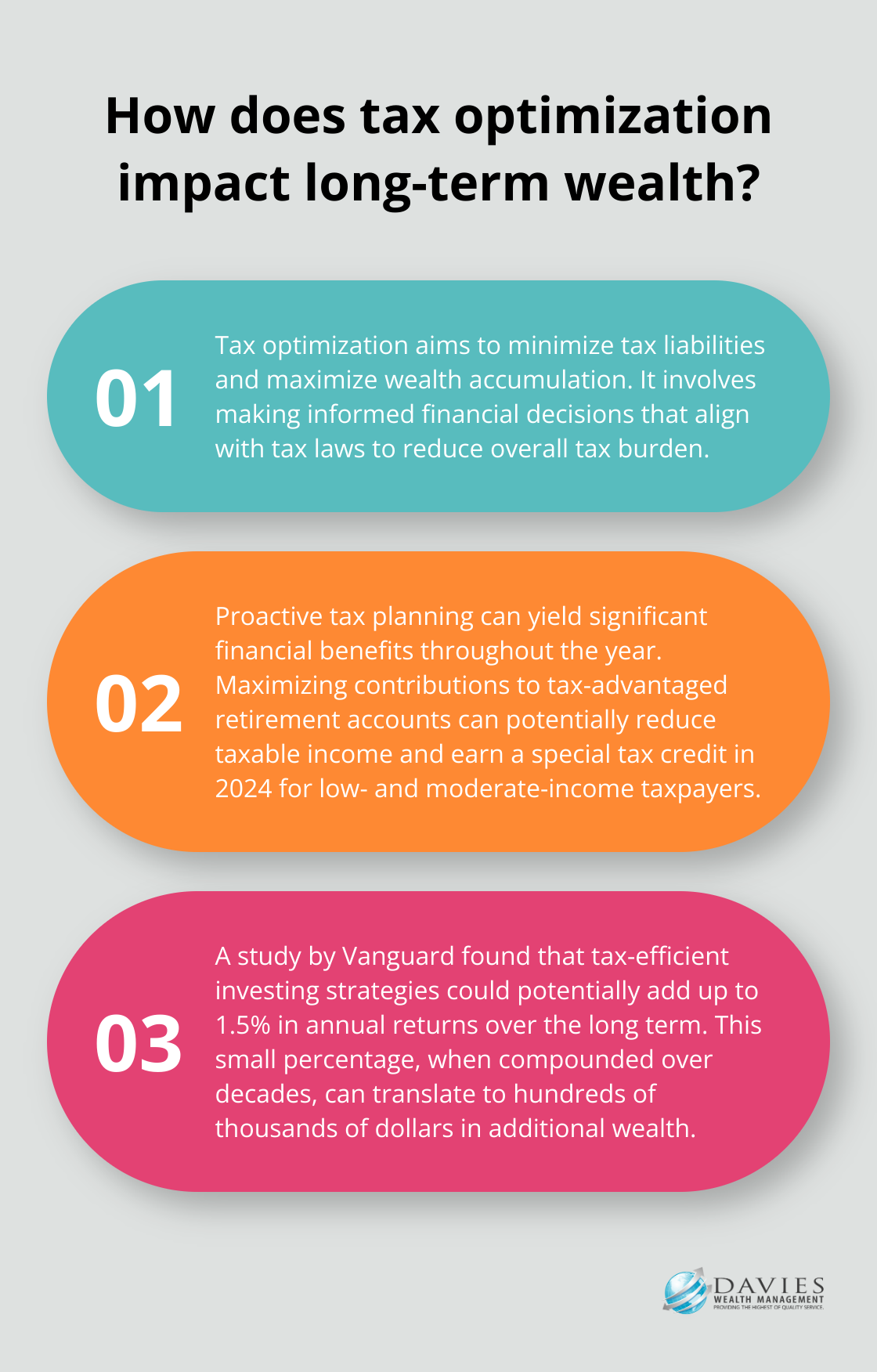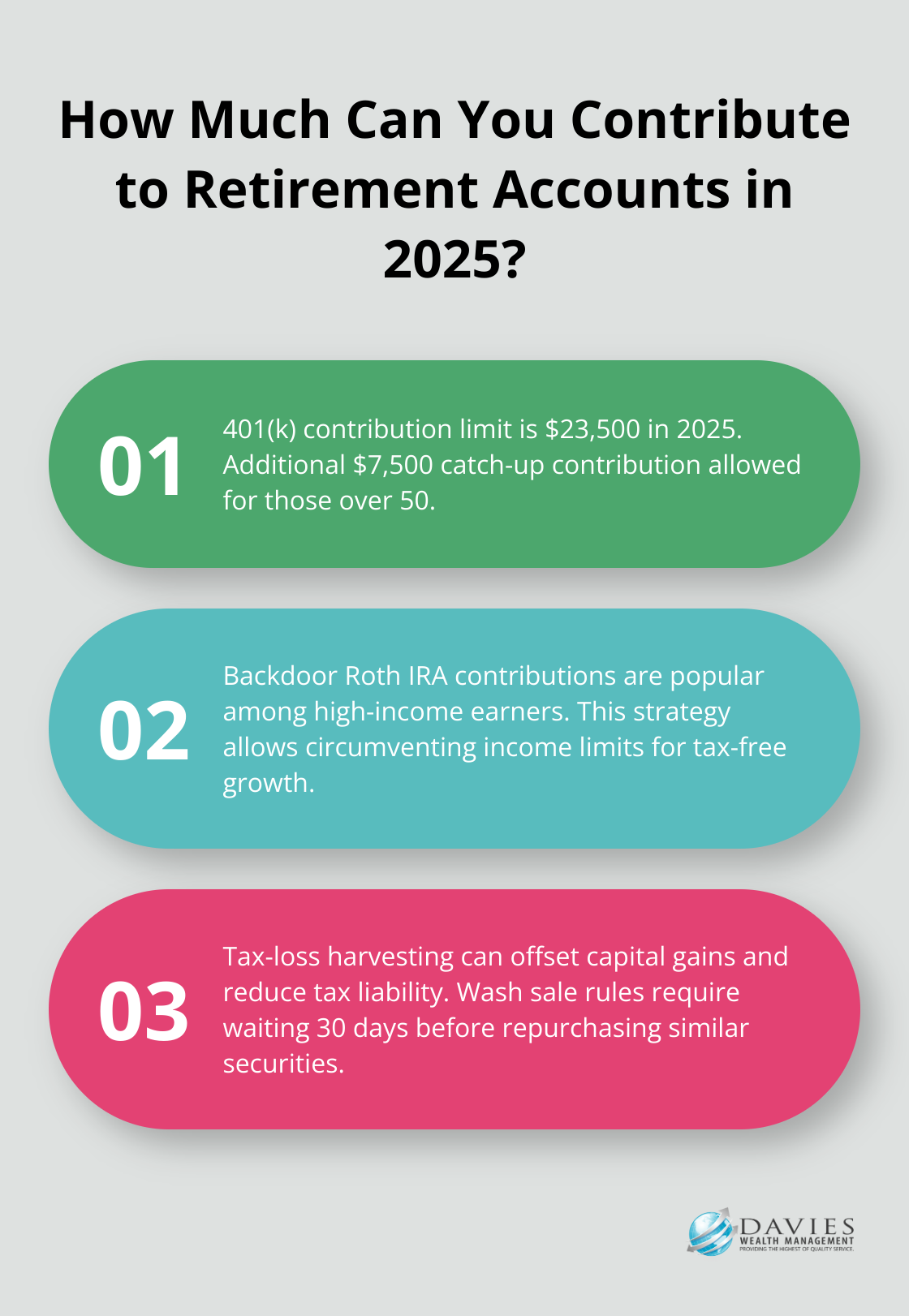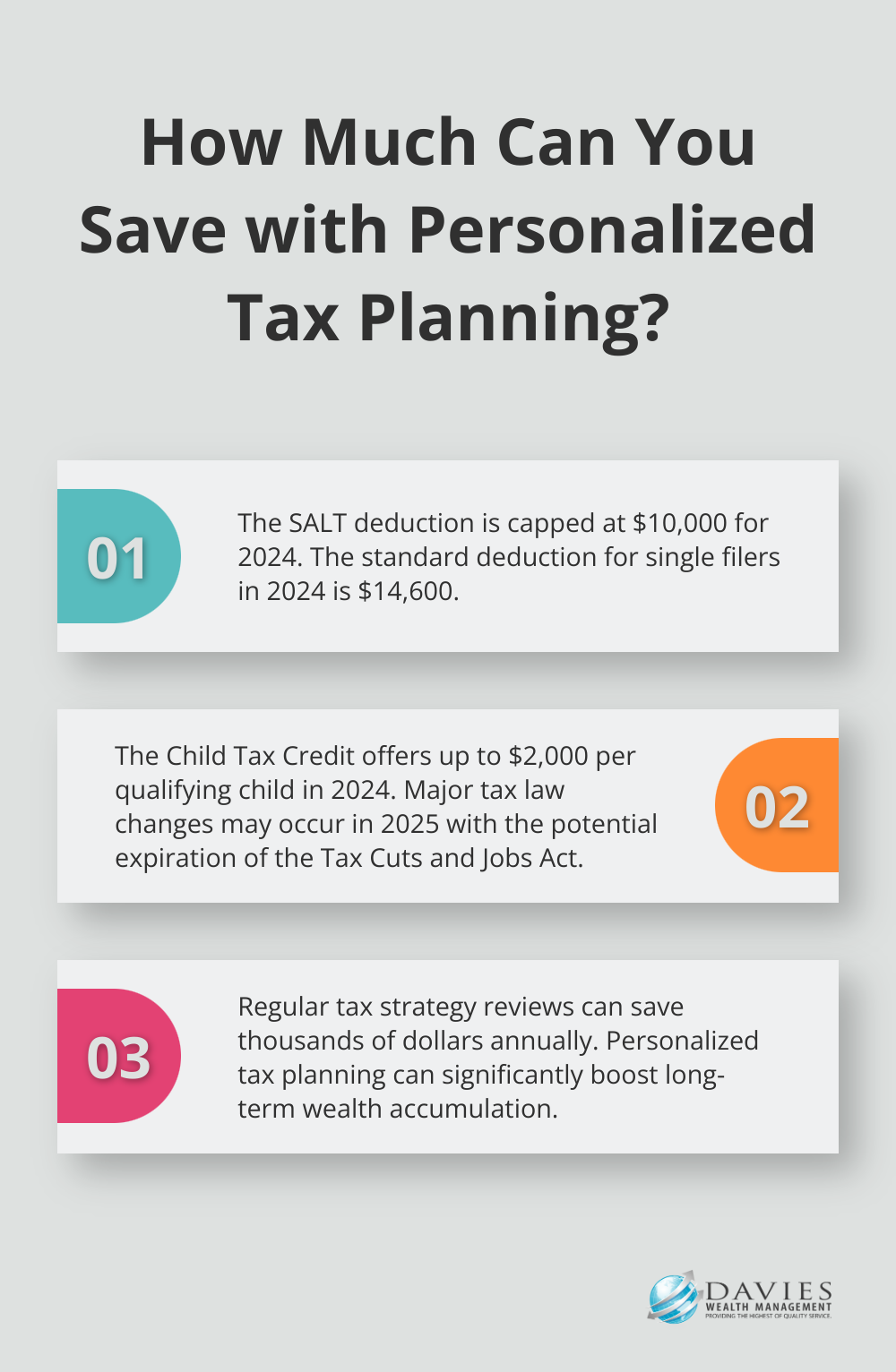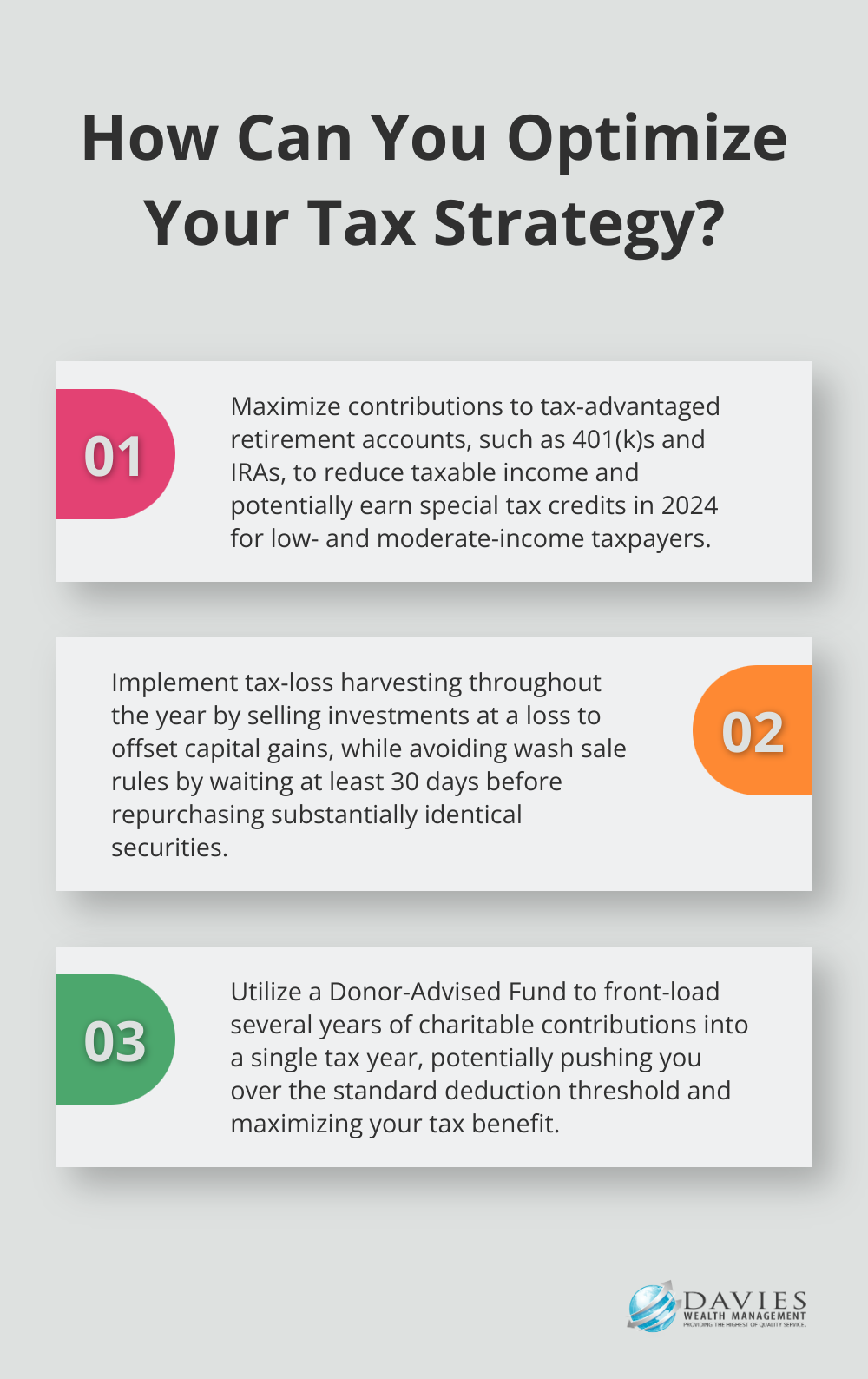Tax optimization strategies can significantly impact your financial well-being, yet many people overlook their importance. At Davies Wealth Management, we’ve seen firsthand how effective tax planning can lead to substantial savings and improved long-term financial outcomes.
This blog post will explore practical techniques to minimize your tax burden legally and ethically, tailored to your unique financial situation. We’ll also dispel common misconceptions about tax planning and highlight the benefits of implementing a robust tax optimization strategy.
Understanding Tax Optimization
Tax optimization consists of minimizing mainly the income tax in order to maximize the result after taxes. At its core, this strategy aims to minimize tax liabilities while maximizing wealth accumulation. Let’s explore the key aspects of tax optimization and dispel common misconceptions surrounding this crucial financial practice.
Defining Tax Optimization
Tax optimization involves making informed financial decisions that align with tax laws to reduce overall tax burden. This process doesn’t equate to tax evasion; rather, it represents a legal and ethical approach to managing one’s finances. Tax optimization strategies can benefit individuals across all income levels, not just the wealthy.
Debunking Tax Planning Myths
Many people mistakenly believe that tax planning only matters during tax season. In reality, effective tax optimization requires year-round attention and adjustments. Another common myth suggests that tax planning is too complex for the average person. However, with the right guidance and resources, anyone can implement effective tax strategies (tailored to their specific financial situation).
The Impact of Proactive Planning
Proactive tax planning can yield significant financial benefits. For example, maximizing contributions to tax-advantaged retirement accounts can potentially reduce taxable income and earn a special tax credit in 2024 for low- and moderate-income taxpayers.
Long-Term Benefits of Tax Efficiency
Tax optimization extends beyond immediate savings; it creates a lasting impact on financial futures. A study by Vanguard found that tax-efficient investing strategies could potentially add up to 1.5% in annual returns over the long term. This seemingly small percentage, when compounded over decades, can translate to hundreds of thousands of dollars in additional wealth.
Customizing Strategies for Unique Situations
Tax optimization strategies should adapt to individual financial circumstances. For instance, professional athletes with high but fluctuating incomes require different tax strategies compared to business owners or retirees. Financial advisors work closely with clients to identify the most effective tax optimization techniques based on specific circumstances and goals.

As we move forward, we’ll explore key tax optimization techniques that can help you take control of your financial future and minimize your tax burden effectively.
Powerful Tax Optimization Techniques
Tax optimization is not just about saving money; it’s about strategic financial management to build long-term wealth. Several powerful techniques can significantly reduce your tax burden while maximizing your financial growth.
Supercharge Your Retirement Savings
One of the most effective ways to optimize your taxes is to maximize contributions to tax-advantaged retirement accounts. In 2025, you can contribute up to $23,500 to your 401(k), with an additional $7,500 catch-up contribution if you’re over 50. This reduces your taxable income and allows your investments to grow tax-deferred.

For those who’ve maxed out their 401(k), a backdoor Roth IRA contribution is worth considering. This strategy allows high-income earners to circumvent income limits and still benefit from tax-free growth. (This technique has gained popularity among savvy investors in 2024.)
Time Your Income and Deductions Wisely
Strategic timing of income and deductions can significantly impact your tax bill. If you expect a lower income year, consider accelerating income into that year. Conversely, in high-income years, look for opportunities to defer income or accelerate deductions.
For instance, self-employed individuals or those with flexible income might delay invoicing clients until January to push income into the next tax year. Similarly, you could prepay deductible expenses in December to increase your current year deductions.
Harvest Your Losses for Tax Savings
Tax-loss harvesting involves selling investments at a loss to offset capital gains. This technique can reduce your tax liability while maintaining your overall investment strategy. Implementing this strategy throughout the year, not just at year-end, can lead to more significant tax savings.
It’s important to avoid wash sale rules by waiting at least 30 days before repurchasing substantially identical securities.
Embrace Tax-Efficient Investing
Choosing tax-efficient investment vehicles can dramatically reduce your tax burden over time. Consider index funds and ETFs, which typically have lower turnover and generate fewer taxable events compared to actively managed funds.
For bond investments, municipal bonds offer tax-exempt interest at the federal level and potentially at the state level for in-state bonds. This can be particularly attractive for high-income investors in higher tax brackets.
Leverage Charitable Giving for Good
Strategic charitable giving not only supports causes you care about but can also provide significant tax benefits. Use a Donor-Advised Fund (DAF) to front-load several years of charitable contributions into a single tax year, potentially pushing you over the standard deduction threshold and maximizing your tax benefit.
For those over 70½, Qualified Charitable Distributions (QCDs) allow you to donate up to $100,000 annually from your IRA directly to charity, potentially lowering your taxable income.
These tax optimization techniques require careful planning and execution. While these strategies can be powerful, it’s essential to tailor them to your specific financial situation and goals. The next section will explore how to customize these strategies to your unique financial circumstances and life events.
How to Personalize Your Tax Strategy
Assess Your Current Tax Situation
The first step to tailor your tax strategy involves a thorough assessment of your current tax situation. This goes beyond simply identifying your tax bracket. You must consider your total income, including wages, investment income, and other sources. Professional athletes, for instance, often face significant income fluctuations year to year, necessitating a more flexible tax strategy.

Examine your deductions and credits next. Many taxpayers fail to take full advantage of available tax breaks. The state and local taxes (SALT) deduction, capped at $10,000 for 2024, serves as a prime example. If your deductions approach the standard deduction threshold ($14,600 for single filers in 2024), you might benefit from bunching deductions in alternate years to maximize tax savings.
Align Your Tax Strategy with Life Events
Major life events often present unique opportunities for tax optimization. Home buyers might deduct mortgage interest and property taxes. New parents can benefit from the Child Tax Credit, which offers up to $2,000 per qualifying child in 2024.
Those approaching retirement should consider Roth IRA conversions. While this strategy requires paying taxes on the converted amount now, it allows for tax-free withdrawals in retirement. This approach proves particularly effective if you anticipate a higher tax bracket in the future.
Collaborate with Financial Professionals
The complex world of tax optimization often requires expert guidance. A skilled financial advisor can help you develop a comprehensive tax strategy that aligns with your overall financial goals. They can also keep you informed about tax law changes, such as the potential expiration of key provisions of the Tax Cuts and Jobs Act in 2025.
Financial advisors often work closely with tax professionals to ensure investment strategies remain tax-efficient. This collaborative approach provides holistic financial advice that considers both investment returns and tax implications.
Regular Reviews and Adjustments
Your tax strategy should evolve as your financial situation changes. Regular reviews with your financial advisor help ensure your tax optimization plan remains effective and aligned with your goals. A proactive, personalized approach to tax planning can potentially save you thousands of dollars each year and significantly boost your long-term wealth accumulation.
Seek Specialized Expertise
For individuals with unique financial situations (such as professional athletes or business owners), seeking specialized expertise proves invaluable. These professionals understand the intricacies of your specific financial landscape and can provide tailored strategies to optimize your tax situation. Davies Wealth Management, for example, offers specialized services for professional athletes, addressing the unique financial challenges they face.
Final Thoughts
Tax optimization strategies extend beyond mere money-saving tactics; they form the foundation of a secure financial future. These strategies, from maximizing retirement contributions to strategic charitable giving, can significantly impact long-term wealth accumulation. Your financial situation demands a unique approach, whether you’re a professional athlete with fluctuating income or a business owner navigating complex tax laws.

Proactive tax planning plays a vital role in long-term financial success. You must stay informed about tax law changes, review your financial situation regularly, and adjust your strategies accordingly. This ongoing process can lead to substantial savings over time, potentially adding significant wealth over your lifetime.
At Davies Wealth Management, we recognize the complexities of tax optimization and the importance of tailored financial advice. Our team of experts will help you navigate the intricacies of tax planning, aligning your financial strategies with your goals and circumstances. Take a proactive approach to tax optimization today to invest in a more secure and prosperous financial future.
✅ BOOK AN APPOINTMENT TODAY: https://davieswealth.tdwealth.net/appointment-page
===========================================================
SEE ALL OUR LATEST BLOG POSTS: https://tdwealth.net/articles
If you like the content, smash that like button! It tells YouTube you were here, and the Youtube algorithm will show the video to others who may be interested in content like this. So, please hit that LIKE button!
Don’t forget to SUBSCRIBE here: https://www.youtube.com/channel/UChmBYECKIzlEBFDDDBu-UIg
✅ Contact me: TDavies@TDWealth.Net
====== ===Get Our FREE GUIDES ==========
Retirement Income: The Transition into Retirement: https://davieswealth.tdwealth.net/retirement-income-transition-into-retirement
Beginner’s Guide to Investing Basics: https://davieswealth.tdwealth.net/investing-basics
✅ Want to learn more about Davies Wealth Management, follow us here!
Website:
Podcast:
Social Media:
https://www.facebook.com/DaviesWealthManagement
https://twitter.com/TDWealthNet
https://www.linkedin.com/in/daviesrthomas
https://www.youtube.com/c/TdwealthNetWealthManagement
Lat and Long
27.17404889406371, -80.24410438798957
Davies Wealth Management
684 SE Monterey Road
Stuart, FL 34994
772-210-4031
#Retirement #FinancialPlanning #wealthmanagement
DISCLAIMER
The content provided by Davies Wealth Management is intended solely for informational purposes and should not be considered as financial, tax, or legal advice. While we strive to offer accurate and timely information, we encourage you to consult with qualified retirement, tax, or legal professionals before making any financial decisions or taking action based on the information presented. Davies Wealth Management assumes no liability for actions taken without seeking individualized professional advice.



Leave a Reply